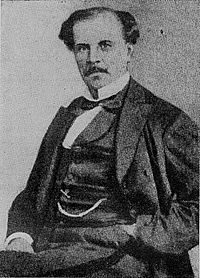Hilario Ascasubi facts for kids
Quick facts for kids
Hilario Ascasubi
|
|
|---|---|

Hilario Ascasubi
|
|
| Born | 1807 Bell Ville, Córdoba |
| Died | November 17, 1875 Buenos Aires |
| Language | Spanish |
| Nationality | Argentine |
| Genre | Gaucho literature |
Hilario Ascasubi (1807 – November 17, 1875) was an Argentine poet, politician, and diplomat. He is well-known for his writings and for being a strong voice against the government of Juan Manuel de Rosas. Ascasubi was also a key figure in gaucho literature, a style of writing that focused on the lives of Argentine cowboys.
Contents
Hilario Ascasubi's Life Story
Hilario Ascasubi was born in 1807 in Bell Ville, Córdoba. It's said he was born in a horse-drawn cart during a thunderstorm! Even though he later became known for his connection to the countryside, he spent his younger years in cities like Buenos Aires.
Early Adventures and Military Service
In 1821, when he was just a teenager, Ascasubi boarded a ship to France. However, the ship was taken over and ended up in Lisbon, Portugal. He managed to escape and lived in France for two years. In the 1820s, he joined the military. He fought in a war against Brazil and later in the Argentine Civil War.
Writing and Exile
Ascasubi began writing against Juan Manuel de Rosas, who was a powerful leader in Argentina. Because of his writings, Ascasubi was forced to leave Argentina and live in Montevideo, Uruguay. While in exile, he continued to write poetry. He also ran a bakery and started a newspaper that supported liberal ideas. This newspaper was against the work of Luis Perez, another writer of the time.
In 1843, Ascasubi published a work called El gaucho Jacinto Cielo con doce números. A few years later, in 1846, he published Paulino Lucero. He and his wife often hosted other Argentines who were also living in exile.
Return to Argentina and Diplomatic Work
Ascasubi eventually returned to Buenos Aires. In 1868, President Bartolomé Mitre sent him on an important diplomatic mission to Paris, France. During his time there, he was put in charge of a new office. This office helped recruit new immigrants and workers for farms in Argentina.
Hilario Ascasubi died in Buenos Aires in 1875. He had just returned from his diplomatic work in France. He passed away due to an intestinal problem. There were some rumors that he might have been poisoned by his political rivals.
Ascasubi's Poetry and Style
Ascasubi is famous for using everyday language in his poems. At that time, the language spoken by the local gaucho people was not usually considered suitable for serious literature. He wrote from the perspective of a gaucho, and his style was seen as very natural and direct.
Themes and Impact
His poems often focused on political topics. He was inspired by the works of another poet, Bartolomé Hidalgo. Ascasubi was one of the few poets from the Unitarian and Colorado groups who became very popular and reached a large audience. His long poem Paulino Lucero was set after Argentina gained independence. It criticized Rosas for not keeping his promises.
Ascasubi also wrote under the name of Santo Vega. This character, a payador (a type of folk singer and poet), was first created by Bartolomé Mitre in 1838. Ascasubi used this character in his own work, Santos Vega o Los mellizos de La Flor. His version was a long poem with beautiful language and many exciting stories.
See also
 In Spanish: Hilario Ascasubi para niños
In Spanish: Hilario Ascasubi para niños
- Argentine literature
- Gaucho literature
 | Roy Wilkins |
 | John Lewis |
 | Linda Carol Brown |

